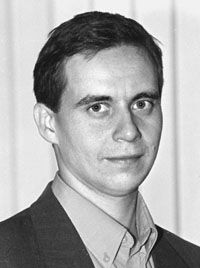“To lobby the nation’s interests in general and economic ones in particular” is how President Leonid Kuchma spelled out the main task for the Ministry of Foreign Affairs, when addressing Ukraine’s ambassadors in European countries. Defending these national interests, according to the President, should not depend on strategic partnership with one country or another. Embassies should continue their course toward economizing foreign policy such that foreign policy should be the continuation of domestic policy. It is time to get down to concrete actions instead of breast-beating about our strategic course toward European integration. It is time to attach real significance to the phrase “strategic partnership.”
All this is fine. It is precisely what The Day wrote one, two, and three years ago. There can be no successful foreign policy without domestic transformation. Strategic partnership must not mean strategic dependence on anybody, be it Moscow, Washington, or Brussels. European integration cannot be confined to abracadabra no longer heeded by anybody, for the words have so far been in conflict with reality. “Stop saying all this rubbish about our aspiration for European integration and do at least something tangible,” West European diplomats and experts have said first in private and then from the rostrums of conferences, round tables, and official meetings. Perhaps rightly so.
Nobody will respect a country that reneges on the pre-planned participation in a contract only due to massive pressure of a strategic partner and is unable to secure an equally good replacement. Nobody can understand why such a state’s elite can do its utmost to preserve a huge dependence on the market and the gas pipe of one country, even if the latter is its main strategic partner. The more so that this chief strategic partner has never made any concession but has always been guided exclusively by its own interests.
In truth, the government, parliament, and especially local authorities have taken very few real steps toward Western institutions. “The investment climate in Ukraine still remains unfavorable,” says one Western diplomat, and there is nothing to refute his observation. There can be no integration without mutual interests, but Ukraine, in the past eight years of its existence, has been an object of fright rather than interest. This means that the changes emerging in its ninth year could well go unnoticed. For example, they were not noticed by the five Ukrainians who sought asylum in Britain precisely on Independence Day.
On the other hand, the ninth anniversary of statehood is just the right time to cast off illusions. Full EU or CIS membership would not necessarily serve Ukraine’s national interests. As for the EU’s interests, Ukraine’s membership is unlikely to meet them even in the distant future, and there is nothing to turn the West around with. This does not mean at all that policies should take a U-turn, the point is that the efforts by diplomats alone will not suffice, no matter how talented and assertive they might be. This only means that any integration for integration’s sake makes no sense.
The national interests, which should guide all official bodies, has to be clear, simple, and easy for everybody to understand. This is where the hardest thing of all appears to be.







